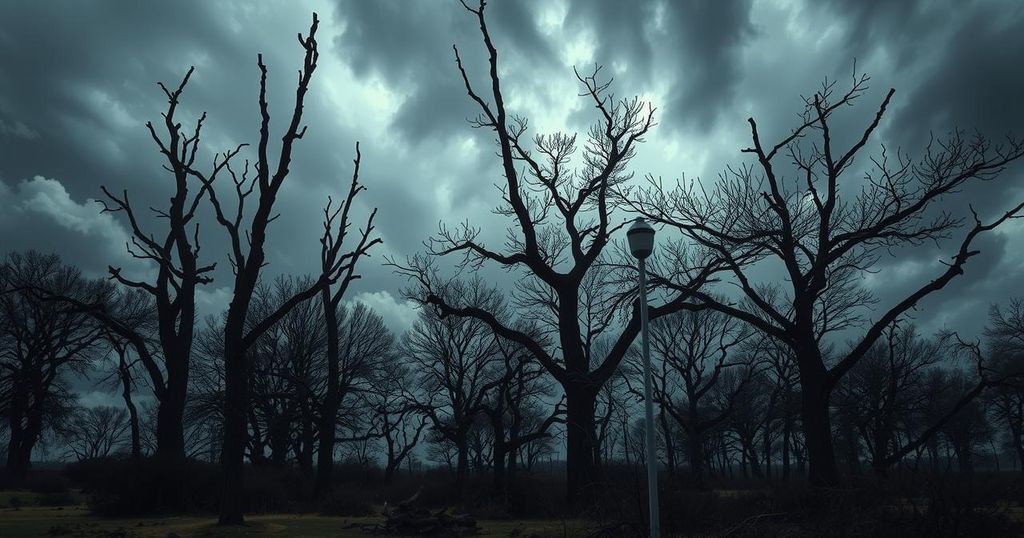Escalating Conflict in the DRC: Lessons from the Past and Paths to Peace

The conflict in the DRC is escalating as M23 rebels capture key cities, raising fears of another regional war reminiscent of past Congo wars. The presence of Rwandan and Ugandan troops complicates the situation. Analysts stress the need for regional cooperation and focus on the DRC’s internal challenges to foster lasting peace and security.
The increasing tension in the Democratic Republic of the Congo (DRC) has led to fears of a reemergence of the horrors of past conflicts as M23 rebels advance towards Kinshasa. The rebels recently gained control of significant eastern cities, Goma and Bukavu, resulting in substantial destruction and displacement. Although the Congolese government has offered a reward for the capture of M23 leaders, this has failed to deter their progress.
Simultaneously, Ugandan troops have escalated their presence along the DRC border. Officially, they are combating local armed groups such as the Allied Democratic Forces and CODECO, amidst reports of CODECO violence that has resulted in numerous civilian fatalities. The involvement of Rwandan and Ugandan forces has stirred concerns among political analysts about the potential for a larger regional conflict reminiscent of the catastrophic Second Congo War.
The ongoing conflict mirrors the events of the 1998 Great Africa War, which involved various regional actors and resulted in millions of deaths due to humanitarian crises and widespread looting of resources. Political analyst Paul Nantulya remarked that current developments reflect a disturbing repetition of past dynamics, exemplified by the humanitarian toll and the ongoing exploitation of the DRC’s natural resources, including coltan and cobalt.
The DRC’s tumultuous history is characterized by decades of violence and instability, largely spurred by both regional grievances and internal corruption. Rwanda’s interventions were ostensibly aimed at addressing threats from Hutu militias, yet they also served to claim DRC’s wealth. Despite the cessation of major wars in the early 2000s, violence persists, exacerbated by regional tensions and violations of human rights.
Reports have implicated Rwanda and Uganda in pillaging DRC’s resources, with allegations of leaders within both nations benefitting financially from exploitation. The International Court of Justice previously ruled Uganda had violated international law during its military involvement in the DRC, underscoring the complexities of accountability in the ongoing crisis.
Current developments include a notable return of influential Congolese political figures aligning with M23, indicating the ongoing entanglement of regional powers in DRC’s affairs. Various African nations are now involved either directly or indirectly, necessitating coordinated regional strategies for de-escalation and peace. Analysts stress the importance of addressing underlying issues such as government legitimacy, corruption, and the marginalization of certain communities to foster sustainable peace.
Calls for national dialogue and international attention, including from the ICC, are viewed as essential steps in addressing the crisis. Advocate Kambale Musuvali emphasizes the urgent need for the Congolese populace to be prioritized in discussions about the future of their country, expressing the belief that the DRC not only needs peace for its own sake but also for the broader stability of the African continent.
The resurgence of conflict in the DRC, highlighted by M23’s advances and regional military involvements, evokes memories of past wars and raises concerns about a potential escalation of violence. The complicity of neighboring nations complicates the humanitarian and political landscape, necessitating comprehensive efforts for negotiation and accountability. The international community, alongside African nations, must collaborate to address the core issues underlying the conflicts, focusing on peace initiatives that prioritize the needs of Congolese people to ensure long-term stability for the entire region.
Original Source: www.aljazeera.com








